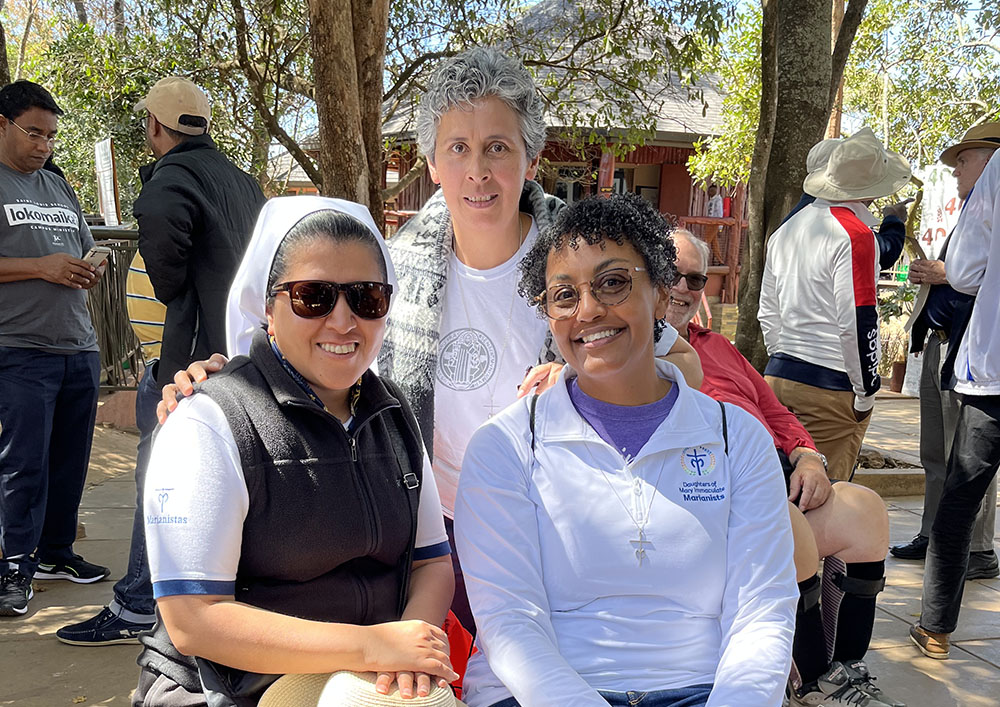
From left: Marianist Srs. Carmen Cadena from Ecuador, Robertina Aldana from Colombia, and Nicole Trahan from the United States pose for a picture in Nairobi, Kenya, during the Nazareth Formation Program. (Frederick Ayoo)
A popular saying within the Marianist Family is, "Community is a gift and a task." For Marianists, whose charism and spirituality are influenced by the Benedictine Rule, community is primary in our way of life. Community is a gift for each of us in the family — the Marianist Lay Communities, the secular institute Alliance Mariale, Marianist sisters (Daughters of Mary Immaculate), and the Marianist brothers and priests (the Society of Mary).
Community is also our gift to the church and the world. We seek to model healthy, nonhierarchical, egalitarian, interdependent relationships within and among our branches. This is a gift, I believe, that the church and world are in dire need of today.
Community also takes work. We recognize that the type of community to which we aspire doesn't simply happen. It takes intentionality, honesty, humility, flexibility, communication, accountability and commitment. Essentially, it requires the action of the Spirit and an openness of heart.
One of the gifts of our family is its internationality. The International Organization of Marianist Lay Communities, a lay association of the faithful, has members in more than 32 countries. The Alliance Mariale is in 12 countries. The Society of Mary is established in close to 30, and the Daughters of Mary Immaculate in 16 countries.
And, of course, within each country, the Marianist Family is not monolithic. We are a richly diverse family.
Since I entered the Marianist Sisters in 2005, I have had the blessing of attending large international meetings and serving on the planning committee for one of them several years ago. These meetings have taken me to Italy, Spain and France. Currently, I am in Kenya on one such program.
The 10-week Nazareth Formation Program is for religious Marianists (sisters, brothers and priests) who are new to or will soon begin accompanying our newer members as formation personnel. There are 28 participants in the program — eight sisters and 20 from the Society of Mary.
Advertisement
We are gathered from 12 countries. I am the only participant from the United States. And all of us are various shades of Black and brown. We are using English and French as our primary languages, but it is common to hear Swahili, Spanish, Hindi and various local languages at meals and in the songs at prayer.
For a religious family born in France in the aftermath of the French Revolution and in which formation personnel were largely European or Americans of European descent as recently as 15 years ago, it says a lot that all the newer formation personnel have no recent familial ties to Europe.
It is also telling that the location of this meeting is in Nairobi because it is closer to the majority of participants. The face of the Catholic Church and, consequently, religious life is changing. And so are we.
What we say about community can also be said of interculturality. It is both a gift and a task. It is a gift to learn with and from one another.
For example, recently, we read various texts about Christian anthropology and the nature of the human person. The discussion after reading was made richer by the diverse experiences of the participants.
We haven't been here long, but I have learned much from the group. And while I haven't yet visited India, Malawi or Vietnam, because of these conversations and others, I feel I have gained a small understanding of their contexts.
We are also growing in our understanding of the values, customs and points of view that have been shaped by the contexts from which people come. This has truly been a gift. And it has also been work.
We all strive to be inclusive in conversations, ensuring that no one feels excluded due to a language barrier. We all make an effort to listen carefully to each other and ask questions instead of assuming we have understood.
We work at including variations in our prayer with small groups, planning each prayer time to avoid favoring a particular style or language.
Each of us steps outside our comfort zone to speak with and get to know those with whom we share neither language nor manner of speaking. We work at not judging the culture from which each person comes. It's exhausting, really. But we are much richer because we are intentional.







